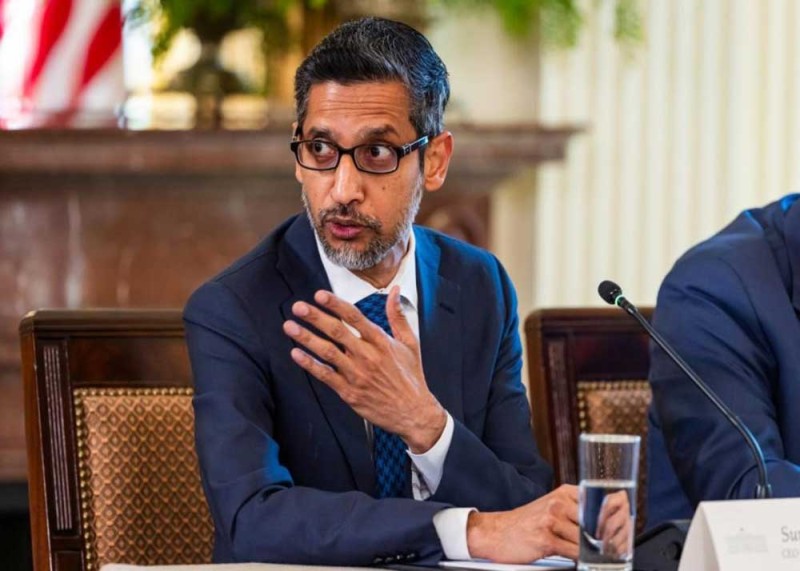
谷歌首席执行官桑达尔·皮查伊表示,人工智也许会砸掉他的饭碗,但他并不太为此担心。
在接受BBC(英国广播公司)的一次广泛访谈中,这位谷歌负责人探讨了技术的飞速发展。他表示,人工智能进步如此之快,以致在未来12个月内,这项技术将能够执行“复杂”任务,并作为用户的代理行事。
“这才是真正有趣的地方,”他说。
他补充说,人工智能甚至可能有能力取代他,执掌这家市值3.5万亿美元的科技巨头。
“我认为,CEO所做的工作,或许是有朝一日AI能够完成的较容易的事情之一,”他说。尽管皮查伊没有具体说明AI能在哪些CEO职能上做得更好,但他指出,这项技术将淘汰一些工作岗位,同时也会使其他岗位“升级和转型”——这些衍生影响意味着“人们将需要适应”。
皮查伊发表上述评论之际,其他科技公司的首席执行官们也预测了首席执行官自动化的新时代即将到来。OpenAI首席执行官萨姆·奥尔特曼(Sam Altman)此前曾表示,AI总有一天会比他做得更好,并补充说,“当那一天到来时,我只会热情欢迎”。先买后付公司Klarna的首席执行官塞巴斯蒂安·西米亚特科夫斯基(Sebastian Siemiatkowski)今年早些时候也在X平台上发帖称,“AI有能力完成我们所有的工作,包括我自己的工作。”
在线学习平台edX调查的500位首席执行官中,另有49%的人认为他们“大部分”或“全部”工作职能应由AI自动化完成,这两位CEO也持此观点。
与此同时,一些人则持相反立场。英伟达(Nvidia)首席执行官黄仁勋(Jensen Huang)去年被问及AI是否会取代他的工作时,回答“绝对不会”。他还表示,AI距离大规模取代工人还很遥远,并补充说,尽管这项技术可能能够将某些部分的工作做得比人类好1000倍,但“就目前而言,AI绝无可能做到我们所做的事情,”他补充道。
除了运营一家价值万亿美元的公司之外,皮查伊声称AI还将带来更针对普通人的革命性应用场景。
“长远来看,这意味着在某些时刻它可以帮你做决策,例如,你可以问它‘我应该投资这只股票吗’,”他说。“或者,我的医生推荐了一种治疗方案,我该如何考虑这种治疗的利弊。”
然而,皮查伊表示,要全面实现AI的能力仍需时日。
“要释放这些能力,我们仍有工作要做,但见证这一进程一直令人无比振奋,”他说。(*)
译者:中慧言-王芳
谷歌首席执行官桑达尔·皮查伊表示,人工智也许会砸掉他的饭碗,但他并不太为此担心。
在接受BBC(英国广播公司)的一次广泛访谈中,这位谷歌负责人探讨了技术的飞速发展。他表示,人工智能进步如此之快,以致在未来12个月内,这项技术将能够执行“复杂”任务,并作为用户的代理行事。
“这才是真正有趣的地方,”他说。
他补充说,人工智能甚至可能有能力取代他,执掌这家市值3.5万亿美元的科技巨头。
“我认为,CEO所做的工作,或许是有朝一日AI能够完成的较容易的事情之一,”他说。尽管皮查伊没有具体说明AI能在哪些CEO职能上做得更好,但他指出,这项技术将淘汰一些工作岗位,同时也会使其他岗位“升级和转型”——这些衍生影响意味着“人们将需要适应”。
皮查伊发表上述评论之际,其他科技公司的首席执行官们也预测了首席执行官自动化的新时代即将到来。OpenAI首席执行官萨姆·奥尔特曼(Sam Altman)此前曾表示,AI总有一天会比他做得更好,并补充说,“当那一天到来时,我只会热情欢迎”。先买后付公司Klarna的首席执行官塞巴斯蒂安·西米亚特科夫斯基(Sebastian Siemiatkowski)今年早些时候也在X平台上发帖称,“AI有能力完成我们所有的工作,包括我自己的工作。”
在线学习平台edX调查的500位首席执行官中,另有49%的人认为他们“大部分”或“全部”工作职能应由AI自动化完成,这两位CEO也持此观点。
与此同时,一些人则持相反立场。英伟达(Nvidia)首席执行官黄仁勋(Jensen Huang)去年被问及AI是否会取代他的工作时,回答“绝对不会”。他还表示,AI距离大规模取代工人还很遥远,并补充说,尽管这项技术可能能够将某些部分的工作做得比人类好1000倍,但“就目前而言,AI绝无可能做到我们所做的事情,”他补充道。
除了运营一家价值万亿美元的公司之外,皮查伊声称AI还将带来更针对普通人的革命性应用场景。
“长远来看,这意味着在某些时刻它可以帮你做决策,例如,你可以问它‘我应该投资这只股票吗’,”他说。“或者,我的医生推荐了一种治疗方案,我该如何考虑这种治疗的利弊。”
然而,皮查伊表示,要全面实现AI的能力仍需时日。
“要释放这些能力,我们仍有工作要做,但见证这一进程一直令人无比振奋,”他说。(*)
译者:中慧言-王芳
Google CEO Sundar Pichai said AI may be gunning for his job, but he doesn't seem too worried about it.
In an expansive interview with the BBC, the Google boss discussed the rapid development of technology. AI is advancing so swiftly, he said, that over the next 12 months the tech will be able to perform “complex” tasks and act as an agent on a users' behalf.
“That's where it gets really interesting,” he said.
AI may even be capable of replacing him at the helm of the $3.5 trillion tech behemoth, he added.
“I think what a CEO does is maybe one of the easier things maybe for an AI to do one day,” he said. Although he didn't talk specifically about CEO functions that an AI could do better, Pichai noted the tech will eliminate some jobs but also “evolve and transition” others---ramifications that mean “people will need to adapt.”
Pichai's comments come as other tech CEOs have also predicted the coming of a new era of chief executive automations. OpenAI CEO Sam Altman previously said AI will someday do his job better than him, adding, “I will be nothing but enthusiastic the day that happens.” Sebastian Siemiatkowski, CEO of buy-now-pay-later firm Klarna, also said in a post on X earlier this year that “AI is capable of doing all our jobs, my own included.”
The two CEOs join another 49% of 500 chief executives surveyed by online learning platform edX who believed “most” or “all” of their job functions should be automated by AI.
Meanwhile, some have taken the opposite stance. Nvidia CEO Jensen Huang, when asked last year about whether AI could take his job, replied “absolutely not.” He also said AI was a long way from replacing workers at a massive scale, adding that while the tech may be able to do some parts of a job up to 1,000 times better, “As we speak, AI has no possibility of doing what we do,” he added.
Apart from running a trillion dollar-plus company, Pichai claimed AI will also bring about revolutionary use cases more targeted to the average person.
“Down the line that means there are moments it can help you make a decision, like it could be, should I invest in this stock, ask the question,” he said. “Or my doctor is recommending a treatment, and how should I think about the pros and cons of that treatment.”
However, Pichai said there's still time before the full capabilities of AI can come to fruition.
“There is still work to be done to unlock those capabilities, but that's the journey which has been so exciting to see,” he said.

